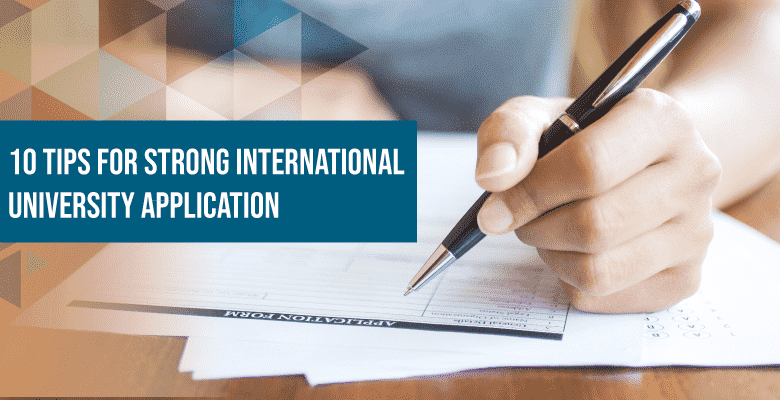10 tips for Strong International University Application
International University Application

To make your study abroad plan successful, a strong admission application is essential. Universities receive thousands of applications from international students, so it is essential to make your application stand out from the crowd. Here are some of the best ways to make sure your application impresses the admission officer and you obtain a place at your preferred university.
Tips for Successful International University Application
Below are the 10 useful tips to make your international university application strong. Do not miss any single tip, as each tip can build or break your dream of studying abroad. Here we go:
1. Get the best academic results
One of the most important factors to any successful application is strong academic results. It is possible to be accepted even if your grades don’t meet the entry requirements, but exceeding them will boost your chances. Make sure to put a little extra effort into your final exams, or when completing a bachelor’s. This is one of the best ways to build your application strong.
2. Include your work experience
Including relevant work experience in your university application can give you real benefits over other applicants. If you are applying for a master’s program abroad, work experience can be important. Especially to get a place in an MBA program. If you don’t have any work experience, think about getting a part-time job, internship, or volunteering.
In some cases, work experience can help you get a place in a program even if you don’t have the required grades. For example, if your grades are below the required level, but you have strong work experience related to the subject, some universities will still consider your application and offer you a seat.
3. Start the application process as soon as possible.
Get started early. The sooner you start your application the better. Preparations for the applications can take time. Many study programs are filled as soon as they receive applications, so if you leave it too late, all the seats may be already filled. Find out the application deadlines of the universities you want to apply for. Make sure your application is submitted well in advance of the deadline.
Additionally, your application will be processed fast and you may get the benefit of discounts on your tuition fee as well as other benefits. Also, note that there is too much competition among international students to get into universities abroad, so always be early to get benefits.
4. Get prepared for the English test
If your first language is not English and you would like to study abroad, you may require to take an English language test to prove your efficiency in the language. When planning your study abroad timeline and booking your test, consider the preparation time for the test. Make sure you put the time in to prepare and practice for the test – a good result will boost your chances of success.
If you are confused about which exam to take, your answer is here: Which test you should take: IELTS vs TOEFL vs PTE
5. Prepare a fantastic personal statement
For most university applications, international students are required to write a thorough and enticing personal statement. It’s also a way you can give yourself an edge over other applicants, so take the time to get them right. Make sure to include all of the following points in your statement of purpose:
- be specific about the course they are interested in and what makes them fit for it
- The source of motivation for the chosen subject
- Relevancy of academic credentials with the selected course
- Qualities that make you worthy of admission
- Skills you have obtained from your work experience, voluntary work, hobbies, or social activities.
- Any additional or non-accredited courses taken.
- Personal or professional achievements
- Your future goals and how this study program will help you achieve them
6. Ask for a recommendation letter
University or program admission sometimes requires one or several recommendation letters from a teacher. Ask for a recommendation letter from your professors or managers that you had a good relationship with. Remember that recommendation letters take time for referees to write. Ask them as early as possible to ensure that they have the time to write a detailed and persuasive recommendation.
7. Collect all the requested documents
This is an essential part of your application, and getting it wrong by missing any documents or sending incorrect information could decrease your chances of admission. Sending incorrect documents or missing any documents can stop your application from moving forwards and set you back weeks.
You should invest time to make sure you have got everything you require, formatted properly, and translated if needed, which will increase the chances of acceptance of your admission application. Almost all international university applications require international students to submit a few documents that include:
- Academic transcripts and degrees
- Personal statements
- References letter
- Identification documents
- Score sheet of language tests
- Your work experience proofs
- Your C.V /Resume
- Certificates of extracurricular activities
8. Get the application process right
The process of submitting your application can be different depending on the country you want to study in. In many countries, international applications are directly received through the university’s website, and you can submit all your documents to them. However, in other countries, there is a centralized platform to apply to universities for both domestic and international students.
While filling out the application form, be very careful. Do not leave any blanks. Do not make careless mistakes in any part of the application. You should always triple-check before submitting the application. You should check this: 6 Strange Mistakes You Should Avoid in Your Study Abroad Application
9. Apply to the right number of universities
It is beneficial to apply to several universities to improve your chances of gaining admission abroad. If you only apply to one or two programs and are unsuccessful, you may miss out on the opportunity to study overseas. Also, take note not to apply to loads of universities because there will be a lot of work to complete lots of applications and also most universities charge a non-refundable fee. This could be quite costly if you apply to more universities than you need to. A sensible approach is to choose around 6-8 universities you want to attend made up of:
10 Be confident for the interview
Some schools and certain elite programs conduct interviews to find which candidates are more qualified to get into the school. The interview usually starts with why you want to study in this school or program, your background, and plans for the future. Prepare well for the interview, be confident, and remain calm. Don’t let the formal atmosphere stress you out.






